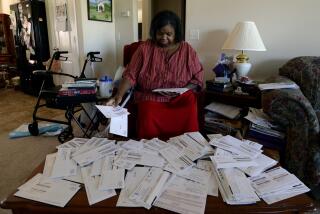Insurance concerns may delay heart attack patients from seeking treatment
- Share via
Patients without health insurance, and those who are insured but fear the cost of medical care, are more likely to delay seeking life-saving treatment when having a heart attack.
For the millions of American adults who don’t have health insurance, and those who have it but worry that illness might ruin them financially, the signs of an impending heart attack do not set in motion the kind of rapid, lifesaving response that medical professionals urge, according to a study conducted at 24 urban hospitals across the nation.
Instead, when uninsured or financially insecure adults feel stabbing chest pain, burning in the shoulders and jaw, or extreme pressure across the midsection, they are more likely than the reliably insured to consider the economic consequences of a false alarm and put off getting help.
That delay, established in a study published Tuesday in the Journal of the American Medical Assn., may be a costly decision for the nation as well as for those who put off seeking care. Long-standing research shows that the longer a heart attack victim delays treatment, the greater the risk of dying.
The new study included only subjects who survived, but its authors speculated that delayed care contributed to the death of many others, helping drive the estimated 45,000 annual U.S. fatalities attributed to a lack of health insurance. And patients who delay getting medical attention for a heart attack are more likely to be rehospitalized for heart problems, to experience heart failure and ongoing chest pains called angina, and to have generally poorer health.
The result: a human and financial toll on which the study’s researchers are collecting data that they expect to tally next.
Just two weeks after the passage of landmark legislation overhauling healthcare, one of the study’s lead authors said its findings underscored the need to go beyond the goal of broadening access to health insurance.
Policymakers must now focus on reassuring Americans that they will be able to afford care when they need it, said Dr. Paul Chan -- especially if insurance companies raise premiums or shift costs to those already on their rolls.
“I think it’s a wake-up call,” said Chan, a cardiologist with St. Luke’s Mid America Heart Institute in Kansas City, Mo. “The affordability of care despite having insurance is going to be an increasingly larger problem as the lack of insurance becomes less of an issue.”
Chan and researchers from across the country and Europe interviewed and combed through the case files of 3,721 patients hospitalized for acute myocardial infarction between April 2005 and the end of 2008. Researchers found that 36.6% with insurance got themselves to a hospital’s emergency department within two hours of the onset of symptoms. Among uninsured patients, 27.5% arrived at a hospital within two hours.
Among uninsured patients, almost half -- 48.6% -- waited at least six hours to go to a hospital. Only 39.3% of those who had secure health insurance waited as long.
Patients who had health insurance, but expressed concern about their finances should they need to use it, fell between those two extremes in both measures: 33.5% of those patients arrived within two hours at a hospital, and 44.6% waited six hours or more to get help.
The authors noted that more than half of these financially concerned patients had fee-for-service (a preferred-provider organization) or health maintenance insurance plans -- options that sometimes leave patients with high out-of-pocket costs when seeking emergency care. And most of those patients would be considered working poor.
“Patients concerned over their ability to pay for treatment, who delay seeking care, are putting themselves at dire risk,” said Dr. Ralph Brindis, president of the American College of Cardiology, who called the JAMA study important.
In Los Angeles, physicians who treat the uninsured and underinsured said they often saw patients delay getting emergency help for their heart symptoms -- and contend with the consequences.
“I have seen people I know have delayed because they just couldn’t afford it,” said Dr. Brian Johnston, chief of emergency services at White Memorial Medical Center. “They require much more extensive treatment.”
He added: “The guy who’s been breaking out in a sweat and calling it indigestion -- that’s the guy you want to get to before he has a heart attack. We will save ourselves and save them an enormous amount of suffering and cost.”
Times staff writer Molly Hennessy-Fiske contributed to this report.







